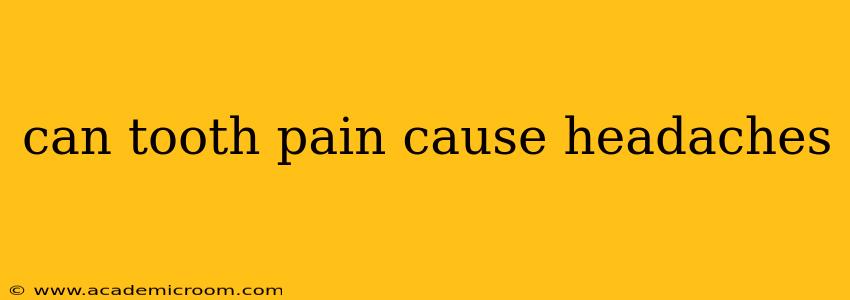Yes, tooth pain can absolutely cause headaches. The connection isn't always obvious, but the intricate network of nerves and tissues in your head and face means that pain originating in your teeth can easily radiate to other areas, leading to headaches. This isn't just a minor inconvenience; understanding the link between toothaches and headaches is crucial for effective diagnosis and treatment.
How Does Tooth Pain Lead to Headaches?
The connection between tooth pain and headaches stems primarily from the trigeminal nerve. This large nerve runs through your face, supplying sensation to your teeth, jaw, and parts of your forehead and temples. When you experience tooth pain, whether from a cavity, abscess, or injury, the trigeminal nerve signals this pain to your brain. This signal can be misinterpreted as pain originating in the head itself, resulting in a headache.
The type of headache associated with tooth pain is often a tension headache or a sinus headache. These are characterized by a dull, aching pain, and the location can vary depending on the affected tooth.
What Kind of Headaches Can Toothaches Cause?
While the most common types associated with tooth pain are tension headaches and sinus headaches, it's important to note that the pain can sometimes manifest as other headache types, depending on the severity and location of the dental issue. Let's explore some possibilities:
Tension Headaches: These are characterized by a tight, pressing feeling, often described as a band squeezing the head. They're frequently associated with stress, but tooth pain can also trigger them.
Sinus Headaches: These headaches stem from inflammation or infection in the sinuses, often located near the upper teeth. Dental problems can exacerbate sinus inflammation, leading to sinus headaches.
Referred Pain: This type of pain is felt in a location different from its origin. Tooth pain's referral to the head is a classic example of referred pain.
How Can I Tell if My Headache is Caused by a Toothache?
Distinguishing between a headache originating in the head and one caused by a toothache can sometimes be tricky. However, here are some clues:
-
Location of Pain: Pay close attention to where the pain starts. Does it begin in your teeth or jaw and then spread to your head? This suggests a toothache is the culprit.
-
Type of Pain: Toothache pain is often sharp, throbbing, or intense, and it can worsen with chewing or biting. Headaches associated with tooth problems might mirror this intense quality.
-
Sensitivity to Temperature: Are your teeth sensitive to hot or cold temperatures? This is a common symptom of dental problems.
-
Jaw Pain: Jaw pain often accompanies toothaches, providing further evidence of a dental origin for the headache.
Can Tooth Infections Cause Headaches?
Absolutely. A dental abscess, which is a pocket of pus caused by a bacterial infection at the root of a tooth, is a particularly common cause of severe headaches. The infection can spread, increasing pressure and causing intense pain that radiates throughout the head. This is a serious condition and requires immediate dental attention.
When Should I See a Doctor or Dentist?
If you experience persistent headaches accompanied by tooth pain, it's crucial to seek professional help. A dentist can diagnose the underlying dental issue and provide appropriate treatment. A doctor may be needed to rule out other potential causes of your headache. Don't delay treatment, especially if you experience:
- Severe, persistent pain
- Fever
- Swelling in your face or jaw
- Difficulty opening your mouth
Ignoring dental problems can lead to more serious complications, so prompt attention is essential.
What are some home remedies for toothaches that might alleviate related headaches?
While home remedies can offer temporary relief, they shouldn't replace professional dental care. Over-the-counter pain relievers like ibuprofen or acetaminophen can help manage pain. Rinsing your mouth with warm salt water can also help soothe minor irritation. Applying a cold compress to the affected area may reduce swelling. Remember, these are temporary measures; if the pain persists, consult a dentist.
This information is for general knowledge and shouldn't be considered medical advice. Always consult a healthcare professional for any health concerns.
